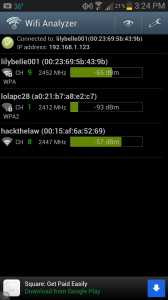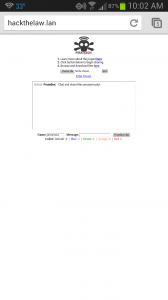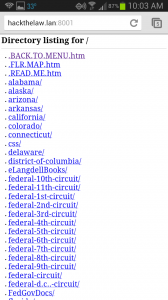There are few “down” times in the CALIverse, but the Christmas through New Year holiday break is one of them. I use the time to do updates and upgrades and installs that would be disruptive at other times of the year. I also use the quiet stretches to try out new things. One of the new things I took a shot at this break is building a PirateBox. A PirateBox is:
Inspired by pirate radio and the free culture movements, PirateBox utilizes Free, Libre and Open Source software (FLOSS) to create mobile wireless communications and file sharing networks where users can anonymously chat and share images, video, audio, documents, and other digital content.
 I grabbed an old Asus Eee PC net book that runs Debian Linux and followed the instructions on the wiki. The setup was pretty straightforward, but it is important to remember that you are disconnecting the wireless on the pc from the Internet and using it to create an access point of its own so once you launch the PirateBox script you no longer have Internet access via wireless. I decided to call my version hackthelaw.
I grabbed an old Asus Eee PC net book that runs Debian Linux and followed the instructions on the wiki. The setup was pretty straightforward, but it is important to remember that you are disconnecting the wireless on the pc from the Internet and using it to create an access point of its own so once you launch the PirateBox script you no longer have Internet access via wireless. I decided to call my version hackthelaw.
Once I had it up and running there was the matter of content. As it happens I have a lot of free law laying around (occupational hazard). I was casting about for a USB thumb drive to load stuff onto when I remember the great Free Law Reporter thumb drive that we did for CALIcon11. It contains LOTS of court opinions in EPUB format and seemed like a perfect starting point for downloads. I took one of the FLR drives and added all of the eLangdell ebooks (all formats), some choice gov docs from FDsys including the US Code, and the EPUB version of the Delaware state code. I plugged this into hackthelaw and had a very nice collection of law that could be downloaded to anyone who connects to hackthelaw.
If you’re still with me, you’re probably asking yourself, “So, what does all this mean to me?” Well, that’s a good question. The hackthelaw box is an open, anonymous network stocked with primary and secondary legal materials that are freely available for download. People can connect to the network and download any of the materials as well as chat with others connected to the network. All this is in a closed network space separate from the Internet. I can easily imagine setting this up in a library as a way for folks to access legal materials and even ask basic questions about the resources. Any device that has WiFi can connect to the network, so folks could download materials directly to their phones or tablets as well as laptops. Consider hackthelaw as another Free Law access point.
Beyond being a distribution node for Free Law, devices like hackthelaw have potential uses in legal education and practice. A closed private network could be used to distribute and receive law school exams. A professor could launch a network at the beginning of a class to provide students with that day’s material. In practice such a device could be used for gather initial client intake information. In conferences or negotiations a private network could handle the exchange of documents between parties. There are lots of possibilities here, and, as time becomes available, I hope to be looking into some of them in the not too distant future.
If you’re interested, I’ll be running some sort of hackthelaw device at the CALI booth in the AALS exhibit hall in New Orleans, January 4 -6, 2013.




One Reply to “Hackthelaw: Piratebox meets Free Law”
Comments are closed.